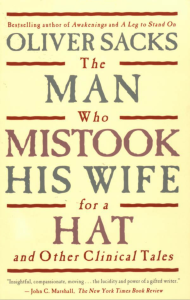 Many students sent me this past week a link to Oliver Sack’s My Own Life, an Op Ed piece in the New York Times.
Many students sent me this past week a link to Oliver Sack’s My Own Life, an Op Ed piece in the New York Times.
Dr. Sacks, the eminent neurologist turned author of books on people whose brains and or senses lack what some might call “normalcy” is facing his own death from liver cancer. Dr. Sacks is 81, a prodigious and prolific writer; he takes to pen to deliver his own eulogy of sorts, a reflection on his life while exhorting himself and serving model to others to be as fully present to what is important in life and the awareness of what the present moment offers.
He writes: “Over the last few days, I have been able to see my life as from a great altitude, as a sort of landscape, and with a deepening sense of the connection of all its parts. This does not mean I am finished with life. To the contrary, I feel a sudden clear focus and perspective. There is no time for anything inessential. I must focus on myself, my work and my friends. I feel intensely alive, and I want and hope in the time that remains to deepen my friendships, to say farewell to those I love, to write more, to travel if I have the strength, to achieve new levels of understanding and insight.”
Within a few hours, Dr. Sacks’ Op Ed piece generated 808 responses to the editor and a note appeared: Comment section closed. Many of the letters were personal, reflections from students and colleagues, from people who drove Dr. Sacks to and from a lecture and from those who encountered him for a moment at the local pool. I wondered if Dr. Sacks would consider reading them essential or inessential. One responder even suggested to Dr. Sacks: “I hope you don’t waste a minute reading these maudlin comments.”
I decided they were essential reading for me, my way to honor the man, who through his books, inspired me to achieve “new levels of understanding and insight.” So I waded through hundreds of these letters, many are a few words, or one or two lines, others are paragraphs long. They fall into the following categories:
- Gratitude and love for Oliver Sacks
- Adulation (Dr. Sacks gets called a “mensch” many times and “brilliant” even more; one person named his son Oliver because of his respect for Dr. Sacks)
- Personal remembrance from students (you inspired me to be a neurologist) and colleagues
- Personal remembrances a moment spent with Dr. Sacks (You have a sweet and gentle stroke, it propels you through the water beautifully. Thank you Dr. Sacks, for a kind comment in a pool, to a stranger; a treasured moment and proof that beauty exists in unexpected places).
- Evoked memories of dealing with dying loved ones
- Unsolicited medical advice (both traditional and other treatment approaches)
- Unsolicited religious /spiritual advice (From accept Jesus to “you live on in your works” to thoughts about the immortality of the soul)
- Reflections on Dr. Sack’s message (You brought tears to my eyes and made me want to do something more significant with my life).
- One short critique (A good essay until he said an individual cannot be replaced. Wishful thinking).
- One long critique (see below)
Death is not an easy topic for many of us and when it gets personal, facing the death of a loved one (including the loved one called “me”) it can get even tougher. Dr. Sacks follows many others in helping us get real about death—“I cannot pretend I am without fear” and he is not creating any false hope for himself —“The cancer occupies a third of my liver, and though its advance may be slowed, this particular sort of cancer cannot be halted.” What shines through is his “predominant feeling of gratitude” for “I have loved and been loved; I have been given much and I have given something in return; I have read and traveled and thought and written. I have had an intercourse with the world, the special intercourse of writers and readers.”
What was the long critique? It is entitled: “May a dissenting voice speak here?” This responder takes offense at what he sees as Dr. Sack’s “need” to focus on his own “productivity”—the prodigious and prolific writings which have endeared him to so many. Indeed, Dr. Sacks does mention that in the last nine years (a gift after being diagnosed then with an ocular melanoma) he has published five books and that in the remaining time left he wants to be as productive as possible (more books to be finished). This responder though is the “man who mistook his life (Oliver Sacks) for that.” Dr. Sacks does admire (his own) productivity, but it is not just “that”—a resume he leaves behind—it is the caring and love and the kindness that infuses his life, whether that is evidenced in the books he writes or in his poolside chats. These are the footprints in the sand of time that are uniquely his—that indeed cannot be replaced.
Oliver Sacks still has (some) time, but as he is doing now, we all do: we live and we die in each moment and we can find comfort in the lovely awareness that he leaves us with: “When people die, they cannot be replaced. They leave holes that cannot be filled, for it is the fate — the genetic and neural fate — of every human being to be a unique individual, to find his own path, to live his own life, to die his own death.”
david









0 Comments